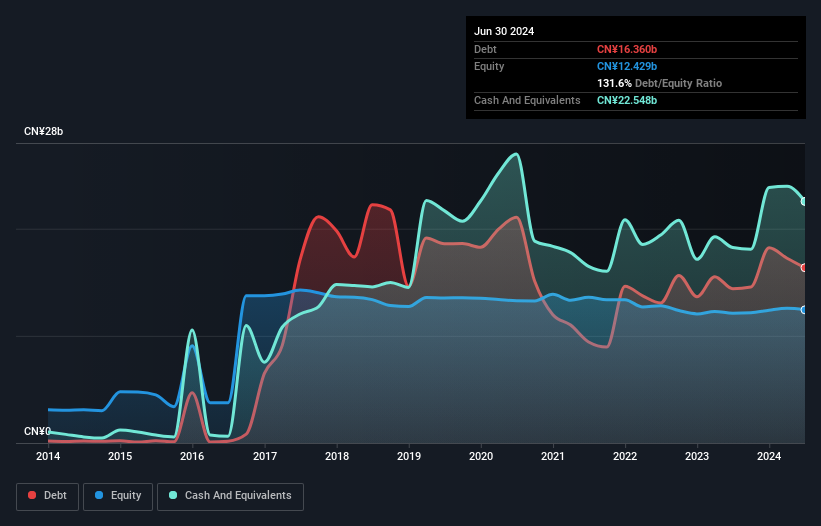Harbin Hatou InvestmentLtd (SHSE:600864) Has A Rock Solid Balance Sheet
Warren Buffett famously said, 'Volatility is far from synonymous with risk.' When we think about how risky a company is, we always like to look at its use of debt, since debt overload can lead to ruin. We can see that Harbin Hatou Investment Co.,Ltd (SHSE:600864) does use debt in its business. But the real question is whether this debt is making the company risky.
When Is Debt A Problem?
Debt and other liabilities become risky for a business when it cannot easily fulfill those obligations, either with free cash flow or by raising capital at an attractive price. If things get really bad, the lenders can take control of the business. While that is not too common, we often do see indebted companies permanently diluting shareholders because lenders force them to raise capital at a distressed price. Of course, the upside of debt is that it often represents cheap capital, especially when it replaces dilution in a company with the ability to reinvest at high rates of return. The first thing to do when considering how much debt a business uses is to look at its cash and debt together.
See our latest analysis for Harbin Hatou InvestmentLtd
What Is Harbin Hatou InvestmentLtd's Net Debt?
As you can see below, at the end of June 2024, Harbin Hatou InvestmentLtd had CN¥16.4b of debt, up from CN¥14.4b a year ago. Click the image for more detail. However, its balance sheet shows it holds CN¥22.5b in cash, so it actually has CN¥6.19b net cash.

How Strong Is Harbin Hatou InvestmentLtd's Balance Sheet?
Zooming in on the latest balance sheet data, we can see that Harbin Hatou InvestmentLtd had liabilities of CN¥21.0b due within 12 months and liabilities of CN¥4.40b due beyond that. Offsetting these obligations, it had cash of CN¥22.5b as well as receivables valued at CN¥5.46b due within 12 months. So it actually has CN¥2.62b more liquid assets than total liabilities.
This surplus suggests that Harbin Hatou InvestmentLtd is using debt in a way that is appears to be both safe and conservative. Due to its strong net asset position, it is not likely to face issues with its lenders. Succinctly put, Harbin Hatou InvestmentLtd boasts net cash, so it's fair to say it does not have a heavy debt load!
On top of that, Harbin Hatou InvestmentLtd grew its EBIT by 47% over the last twelve months, and that growth will make it easier to handle its debt. The balance sheet is clearly the area to focus on when you are analysing debt. But you can't view debt in total isolation; since Harbin Hatou InvestmentLtd will need earnings to service that debt. So when considering debt, it's definitely worth looking at the earnings trend. Click here for an interactive snapshot.
Finally, while the tax-man may adore accounting profits, lenders only accept cold hard cash. Harbin Hatou InvestmentLtd may have net cash on the balance sheet, but it is still interesting to look at how well the business converts its earnings before interest and tax (EBIT) to free cash flow, because that will influence both its need for, and its capacity to manage debt. Over the last three years, Harbin Hatou InvestmentLtd actually produced more free cash flow than EBIT. There's nothing better than incoming cash when it comes to staying in your lenders' good graces.
Summing Up
While we empathize with investors who find debt concerning, you should keep in mind that Harbin Hatou InvestmentLtd has net cash of CN¥6.19b, as well as more liquid assets than liabilities. And it impressed us with free cash flow of CN¥2.1b, being 782% of its EBIT. When it comes to Harbin Hatou InvestmentLtd's debt, we sufficiently relaxed that our mind turns to the jacuzzi. The balance sheet is clearly the area to focus on when you are analysing debt. However, not all investment risk resides within the balance sheet - far from it. For example Harbin Hatou InvestmentLtd has 2 warning signs (and 1 which doesn't sit too well with us) we think you should know about.
If, after all that, you're more interested in a fast growing company with a rock-solid balance sheet, then check out our list of net cash growth stocks without delay.
Have feedback on this article? Concerned about the content? Get in touch with us directly. Alternatively, email editorial-team (at) simplywallst.com.
This article by Simply Wall St is general in nature. We provide commentary based on historical data and analyst forecasts only using an unbiased methodology and our articles are not intended to be financial advice. It does not constitute a recommendation to buy or sell any stock, and does not take account of your objectives, or your financial situation. We aim to bring you long-term focused analysis driven by fundamental data. Note that our analysis may not factor in the latest price-sensitive company announcements or qualitative material. Simply Wall St has no position in any stocks mentioned.
 Index Options
Index Options CME Group
CME Group Nasdaq
Nasdaq Cboe
Cboe TradingView
TradingView Wall Street Journal
Wall Street Journal